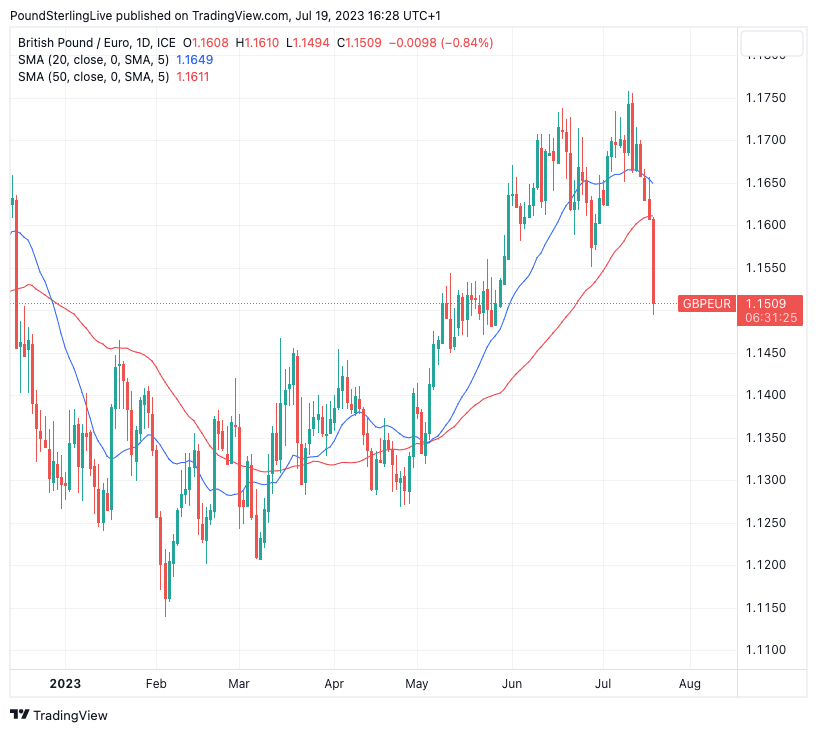Pound Hits 7-week Low against Euro
- Written by: Gary Howes

Image © Adobe Images
Pound Sterling is prone to further weakness against the Euro in the short term with a technical deterioration on the charts advocating for further downside and suggesting the 2023 uptrend had faded.
The Pound to Euro exchange rate fell to its lowest level in seven weeks after the release of data showing a material decline in UK inflation in June.
The 7.9% year-on-year increase in CPI inflation reported by the ONS was well below the 8.2% expected by the market and May's 8.7%, and economists reckon inflation is on track to record further material declines over the coming months.
Market participants have slashed expectations for further Bank of England interest rate rises with the peak in Bank Rate now seen nearer 5.75% according to money market pricing, down from the eye-watering 6.5% expected earlier this month. The odds of a 50 basis point hike on August 03 fell to 40% on Thursday morning having been a sure bet just a week prior following the release of above-consensus wage data.
Deflating expectations for the peak in Bank Rate have translated into weakness for Pound exchange rates across the board.
"The lower-than-expected inflation numbers also have resulted in a halt in the rally in sterling," says Georgette Boele, Senior FX Strategist at ABN AMRO.
"Sterling fell sharply against both the euro and the US dollar on the inflation news. Against the euro, it has slid to its lowest level since late May," says Rhys Herbert, an economist at Lloyds Bank.
The 0.50% fall in GBPEUR of July 19 ensured the exchange rate sliced through the 50-day moving average, a bearish development that advocates for further weakness.
Above: GBPEUR at daily intervals showing the technical breakdown as the exchange rate slices through the 50-day moving average.
At the very least a period of sideways movement is about to unfold.
The inflation release has caused a turnaround in the direction in GBP/EUR, according to Boele who expects further rerating in Bank of England interest rate expectations.
"This will probably weigh on sterling this year," she adds.
But an outright collapse in the Pound-Euro rate looks unlikely at this juncture given the stable economic, fiscal and monetary backdrop in the UK.
Indeed, the Bank of England will still 'out hike' the European Central Bank, leaving the Pound supported by a higher yield profile relative to the Eurozone.
Above: GBPEUR has fallen as UK two-year bond yields have fallen faster than their German counterparts (lower panel, showing the spread between GB 2YR yield and DE 2YR yield).
Those watching Pound-Euro moves should now monitor next week's European Central Bank (ECB) meeting as it could prove more 'dovish' than markets are expecting.
Such an outcome could weigh on EUR and allow GBPEUR to stabilise as the spread between UK and German bond yields would widen once more (see the above chart).
Hints of a 'dovish' ECB surprise were floated by ECB Governing Council Member Knot, one of the more 'hawkish' council members, who appears to now be of the view that interest rates are close to where they should be.
With regards to future rate hikes, "for July I think it is a necessity, for anything beyond July it would at most be a possibility but by no means a certainty," Knot told Bloomberg TV. This exposes market pricing to a downward revision in ECB rate hike expectations.
"Comments like these illustrate that a September step can be called into question," says You-Na Park-Heger, FX Analyst at Commerzbank. "If the market increasingly reaches this conclusion too - the ECB might even provide more concrete reasons for that next week - EUR might temporarily come under depreciation pressure."
Compare Currency Exchange Rates
Find out how much you could save on your international transfer
Estimated saving compared to high street banks:
£2,500.00
Free • No obligation • Takes 2 minutes






